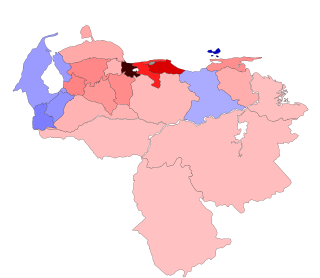
Elections in Venezuela are held at a national level for the President of Venezuela as head of state and head of government, and for a unicameral legislature. The President of Venezuela is elected for a six-year term by direct election plurality voting, and is eligible for re-election. The National Assembly (Asamblea Nacional) has 277 members (diputados), elected for five-year terms using a mixed-member majoritarian representation system. Elections also take place at state level and local level.

COPEI, also referred to as the Social Christian Party or Green Party, is a Christian democratic party in Venezuela. The acronym stands for Comité de Organización Política Electoral Independiente, but this provisional full name has fallen out of use. The party was influential during the twentieth century as a signatory of the Puntofijo Pact and influenced many politicians throughout Latin America at its peak.

Presidential elections were held in Venezuela on 3 December 2006 to elect a president for a six-year term to begin on 10 January 2007. The contest was primarily between incumbent President Hugo Chávez, and Zulia Governor Manuel Rosales of the opposition party A New Era.

Parliamentary elections were held in Venezuela on 4 December 2005 to elect the 167 deputies to the National Assembly of Venezuela, twelve deputies to the Latin American Parliament and five deputies to the Andean Parliament. Several days prior to the elections, five opposition parties unexpectedly withdrew, shortly after a dispute over the voting process had apparently been resolved with the support of the Organization of American States (OAS). The opposition had been expected to get around a third of the Assembly seats, or even less; the withdrawal meant the opposition were scarcely represented in the parliament at all, as the opposition parties which did not withdraw failed to win any seats. 114 seats went to the President's Fifth Republic Movement (MVR) – up from 86, with the remaining 53 going to "smaller pro-Chávez parties as well as to independents and representatives of some social groups that support the government".

María Corina Machado Parisca is a Venezuelan politician and industrial engineer who is currently opposition leader in Venezuela. She served as an elected member of the National Assembly of Venezuela from 2011 to 2014.

Henrique Capriles Radonski is a Venezuelan politician and lawyer, who served as the 36th Governor of Miranda from 2008 to 2017.

Regional elections were held in Venezuela on 23 November 2008 to choose 22 governors and 2 metropolitan mayors. The candidates were selected for a term beginning in 2008 and ending in 2012, when the next regional elections will be held. The 2008 regional elections were the second during the government of Hugo Chávez Frías and the first since he founded the United Socialist Party.

Antonio José Ledezma Díaz is a Venezuelan lawyer, opposition politician and former political prisoner. After unsuccessfully challenging for the leadership of Democratic Action in 1999, he founded a new party, the Fearless People's Alliance.

The 2010 parliamentary election in Venezuela took place on 26 September 2010 to elect the 165 deputies to the National Assembly. Venezuelan opposition parties, which had boycotted the previous election thus allowing the governing Fifth Republic Movement (MVR) to gain a two-thirds super majority, participated in the election through the Coalition for Democratic Unity (MUD). In 2007 the Fifth Republic Movement dissolved and the United Socialist Party of Venezuela was formed as the leading government party. Nationally, the popular vote was split equally between PSUV and MUD, but PSUV won a majority of the first-past-the-post seats and consequently retained a substantial majority in the Assembly, although falling short of both two-thirds and three-fifths super majority marks.

The Democratic Unity Roundtable was a catch-all electoral coalition of Venezuelan political parties formed in January 2008 to unify the opposition to President Hugo Chávez's United Socialist Party of Venezuela in the 2010 Venezuelan parliamentary election. A previous opposition umbrella group, the Coordinadora Democrática, had collapsed after the failure of the 2004 Venezuelan recall referendum.

Parliamentary elections were held in Venezuela on 6 December 2015 to elect the 164 deputies and three indigenous representatives of the National Assembly. They were the fourth parliamentary elections to take place after the 1999 constitution, which abolished the bicameral system in favour of a unicameral parliament, and the first to take place after the death of President Hugo Chávez. Despite predictions from the opposition of a possible last-minute cancellation, the elections took place as scheduled, with the majority of polls showing the Democratic Unity Roundtable (MUD) holding a wide lead over the ruling United Socialist Party of Venezuela (PSUV) and its wider alliance, the Great Patriotic Pole (GPP).

Presidential elections were held in Venezuela on 20 May 2018, with incumbent Nicolás Maduro being declared reelected for a second six-year term. The original electoral date was scheduled for December 2018 but was subsequently pulled ahead to 22 April before being pushed back to 20 May. Some analysts described the poll as a sham election, as many prominent opposition parties had been barred from participating in it. The elections had the lowest voter turnout in Venezuela's democratic era.

Regional elections were held in Venezuela on 15 October 2017 to elect the executive position of all 23 federal entities. This marked the first state executive election not held on the same date as elections for state legislatures, and the second separate from municipal elections. They were the 9th regional elections held in Venezuela since 1989.

Municipal elections were held in Venezuela on 10 December 2017, to elect 335 mayors throughout Venezuela, as well as the governor of the state of Zulia. This was the first municipal election held since 2013, when elections were delayed from 2012 following the death of Hugo Chávez. The election resulted in many members of the United Socialist Party of Venezuela being elected as heads of municipal governments throughout Venezuela.

The primary elections of the Unity Roundtable were held on February 12, 2012, and determined the presidential candidate of the Democratic Unity Roundtable (MUD) for the 2012 Venezuelan presidential election, which were held on October 7, As well as their candidates in the coming regional and municipal elections, to be held in December 2012 and December 2013 respectively. These were the first open presidential primaries in the history of Venezuela, and the largest of its kind and in participation in world history.
Parliamentary elections were held in Venezuela on 6 December 2020. Aside from the 167 deputies of the National Assembly who are eligible to be re-elected, the new National Electoral Council president announced that the assembly would increase by 110 seats, for a total of 277 deputies to be elected.

Tarek William Saab Halabi is a Venezuelan politician, lawyer, and poet. He was a leader of the Fifth Republic Movement (MVR) party founded by Hugo Chávez, President of Venezuela, who publicly called him "The poet of the revolution". He was the Governor of Anzoátegui from 2004 to 2012, and a member of the Committee for Justice and Truth since 2013. In December 2014, he was elected "People's Defender", or Ombudsman, by the National Assembly for 2014–2021 term. On 5 August 2017, the National Constituent Assembly appointed him as Attorney General in substitution of Luisa Ortega Diaz.

Regional and municipal elections were held in Venezuela on 21 November 2021. In the elections, all executive and legislative positions of the 23 federal entities, as well as that of the 335 municipalities of the country, were renewed.

This article describes the history of Venezuelan opposition to the Chavista governments of former President Hugo Chávez and current President Nicolás Maduro. Commonly referred to as the Venezuelan opposition, or sometimes, anti-Chavismo, these political umbrella terms are used to describe political, social and religious movements that have opposed Chavismo, and the associated Bolivarian Revolution political process since 2 February 1999. It outlines the various parties involved, focusing on the evolution of the opposition movement, its candidates, and key leaders.
Caryslia Beatriz Rodríguez Rodríguez is a Venezuelan attorney, politician and judge who was named by Nicolás Maduro as president of Venezuela's Supreme Tribunal of Justice (TSJ) in January 2024, while also serving as a judge in the Electoral Chamber of the high court. A member of the United Socialist Party of Venezuela (PSUV), she previously served as the acting mayor of Caracas, and was counselor for the government and headed the Municipal Chamber of Caracas.


















